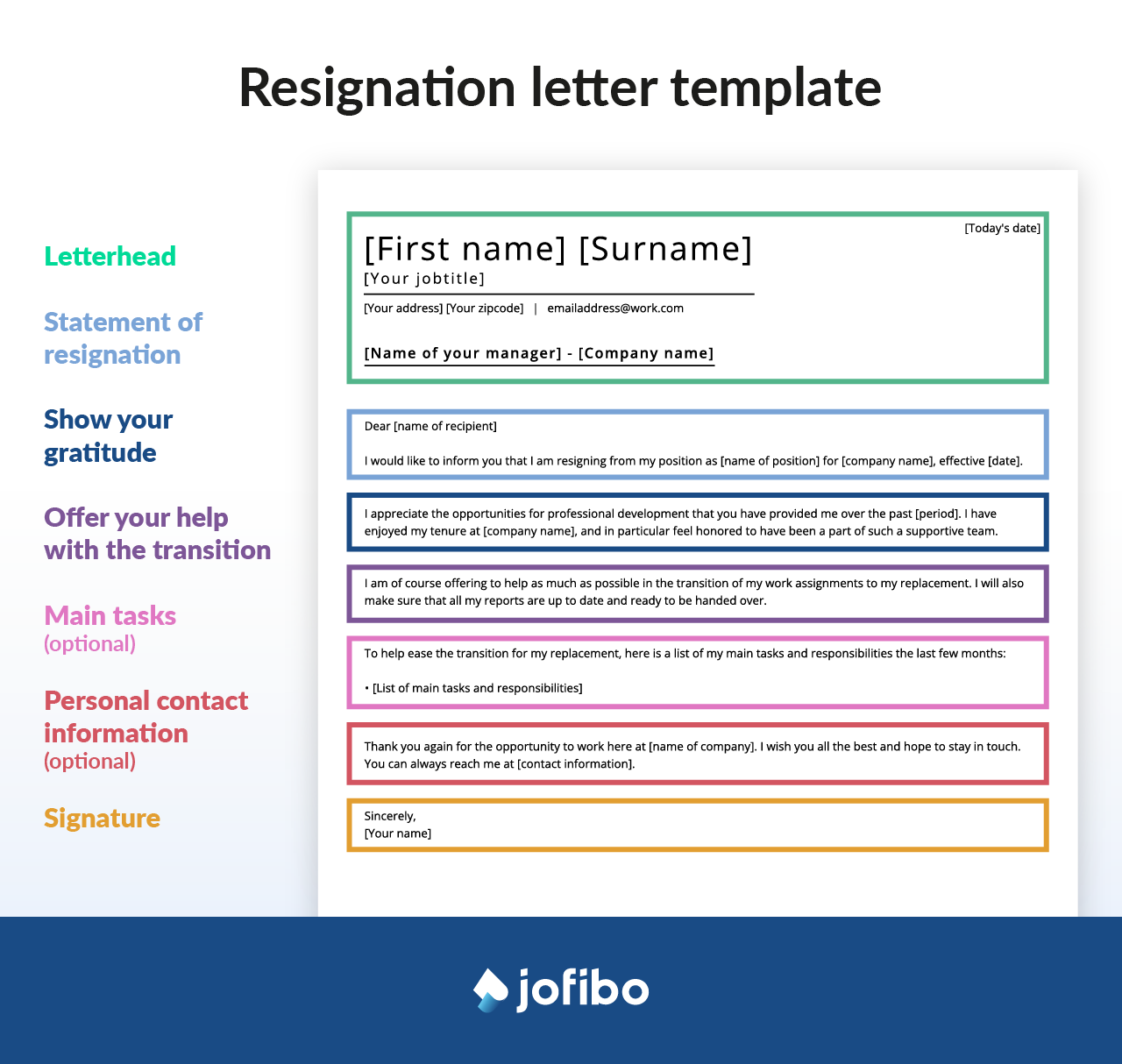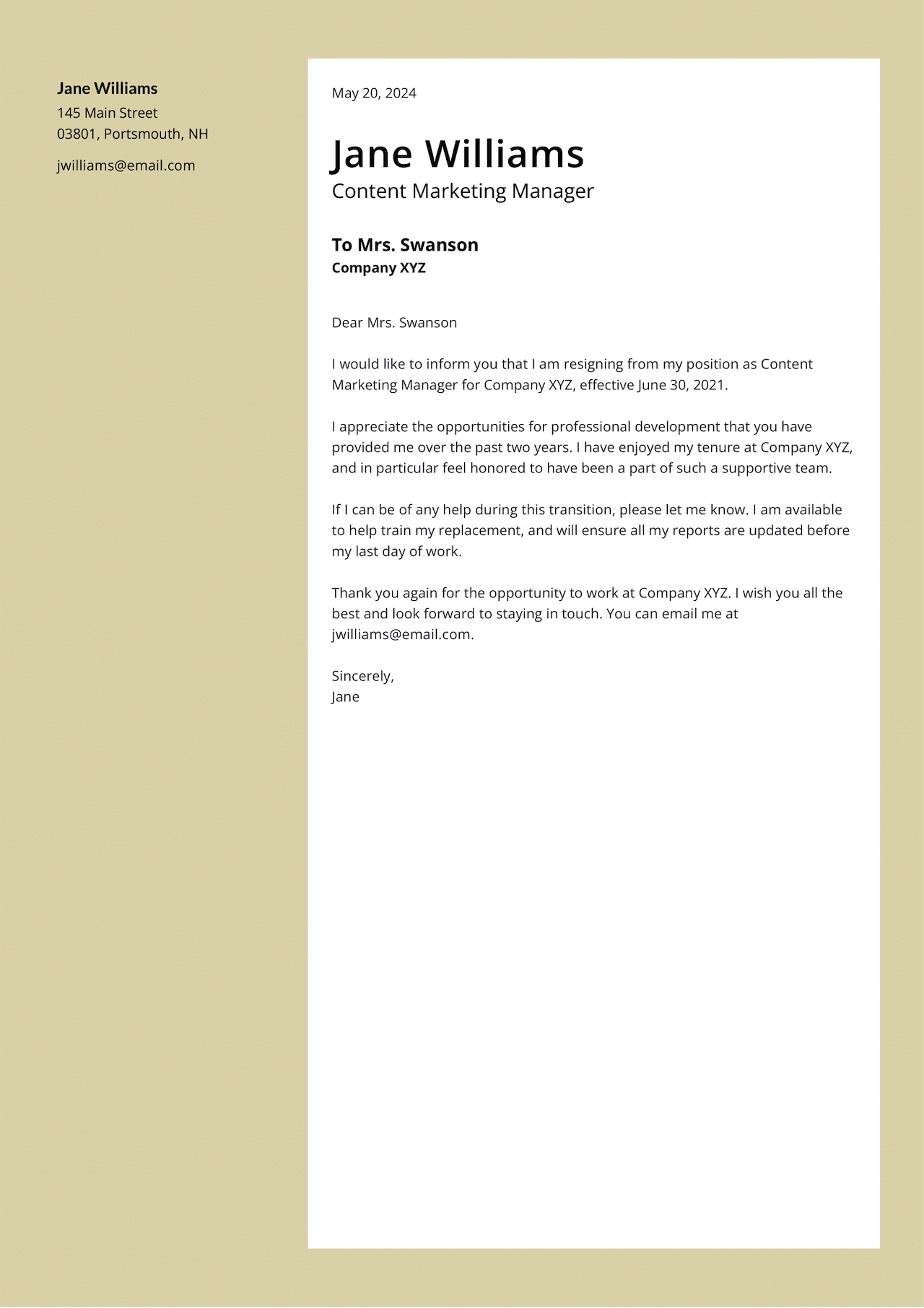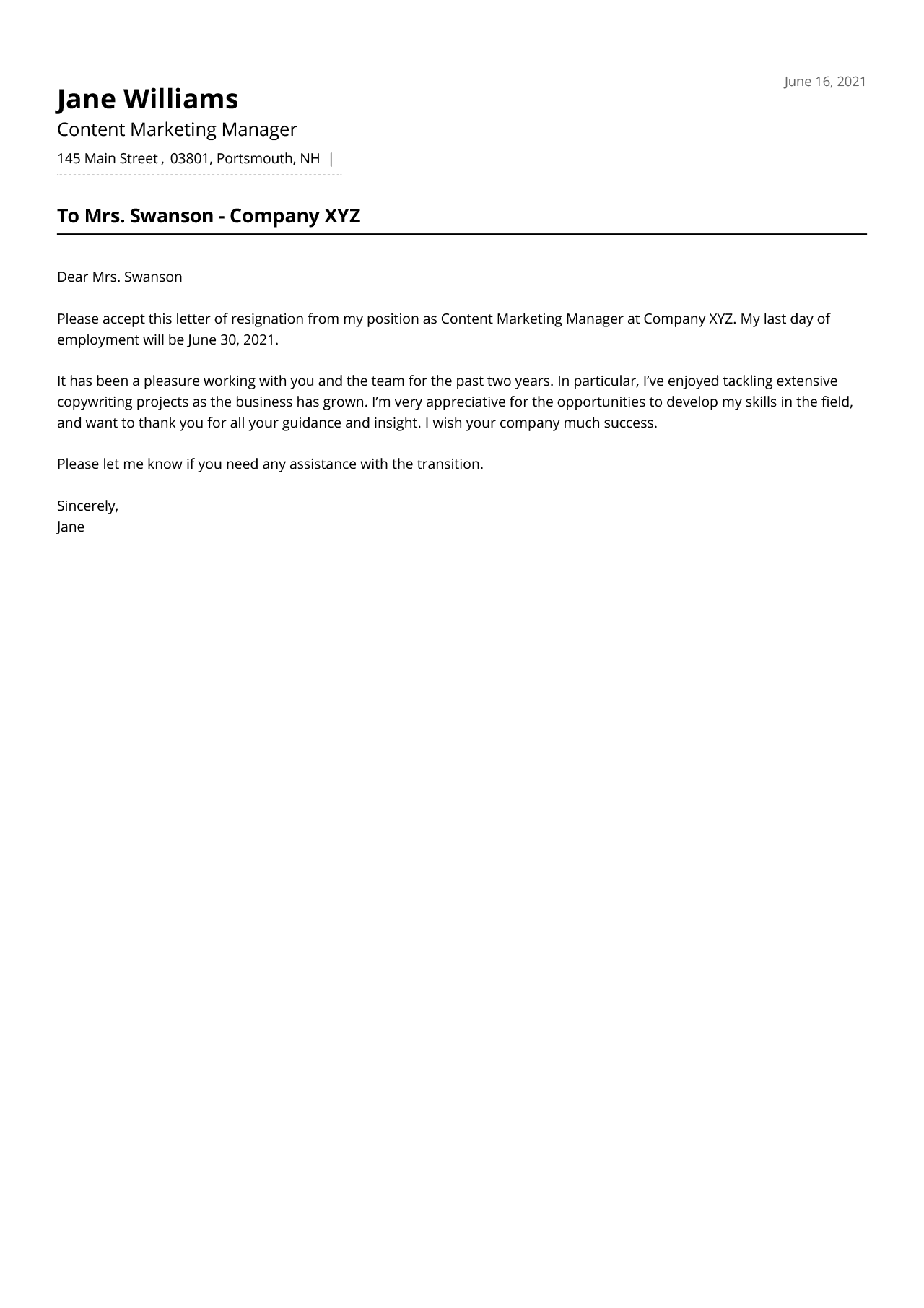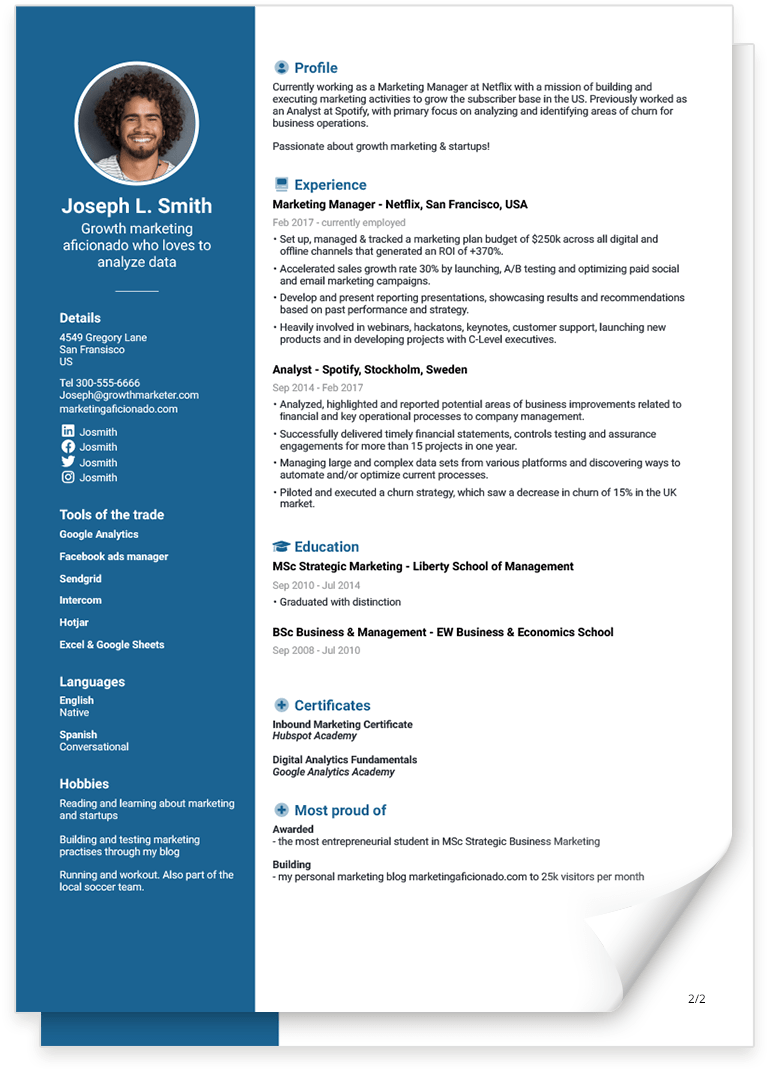How to Write a Professional Resignation Letter [With Samples]
![How to Write a Professional Resignation Letter [With Samples]](https://jofibostorage.blob.core.windows.net/blog/how-to-write-a-professional-resignation-letter-header.png)
So, it’s time for you to move on with your career?
Quitting a job is a big decision and should be handled with care.
The most important part to remember is not to burn your bridges - not even if you hope to never see any of your soon-to-be former colleagues again. A great letter of resignation can help you there.
In this article we will show you:
- What is a letter of resignation?
- Best practices for how to write a letter of resignation
- Resignation letter templates
- Resignation letter samples
What is a letter of resignation?
Formally speaking, a letter of resignation is a way of expressing your intention of leaving your current job. The document formalizes your decision to leave the company while conveying your reasons to do so. If you succeed in writing a good resignation letter, it might even smooth out the process of leaving.
Of course the first step you must take is to have a one-on-one conversation with your boss to let him or her know that you are planning to resign.
The resignation letter is the formal follow up on this conversation. Note that just like your resume it will most likely become part of your employee file which is one of the reasons why it’s important to leave with a good impression.
Best practices for how to write a letter of resignation
Writing a resignation letter can be a daunting task for some. That’s why we decided to collect a whole bunch of best practices for how to write a resignation letter right here. Read on to learn more about what to include in your letter, when you should submit it and how.
When should you write a letter of resignation?
When you resign from your job, there are certain resignation etiquettes that you need to follow in order to leave things as smoothly as possible. One of those etiquettes is the amount of time you need to give your boss to prepare for your departure.
In the US the standard practice for sending in your resignation letter is two weeks before you stop. If you live somewhere else you will need to do a bit of research to find out what the standard resignation period is for your country.
This will provide your boss with sufficient time to find your replacement. It will also ensure that you’ll be able to hand over your assignments to a new person or to one of your colleagues.
You can choose to hand in your resignation letter earlier, but do avoid sending it later than two weeks before. However, if your employment contract states how much notice you should give you should obviously follow that instead.
Keep in mind that your employer is not obligated to accept your two weeks notice. Some employers will want you to stop right away so be prepared for that.
How should you submit your resignation letter?
There are really only two ways of submitting your resignation letter: in person in the shape of a physical letter or by email.
What’s most appropriate for you will depend on various factors. One isn’t better than the other. If you have a paperless culture, an email might be the appropriate choice.
However, regardless of how you decide to send your resignation letter, make sure you’ve talked to your boss in person before. It may seem uncomfortable but in the long run it’s the best way to go about it.
A graceful resignation includes these steps:
- Have a conversation with your boss
- Hand in your letter of resignation
- Be helpful in any way to make the transition easier
Resignation letter template - what should you include in your resignation letter?
A resignation letter is much like any other business letter such as a cover letter. It consists of a letterhead, 3-4 paragraphs concerning your resignation, and a signature.
Unlike a resume where you can choose between different formats, a resignation letter is pretty straightforward.
Here’s what you should include in your letter of resignation:
Letterhead
Begin your resignation letter by stating your name, your job title, and all other relevant information. This might seem redundant, especially if you’re working in a small company, but since the letter will become part of your employee file it’s still important. Include information such as:
- Your name
- Current job title
- Your work email address
- Your address
- Name of manager
- Current organization
- Today’s date
Statement of resignation and end date
State your intentions of resigning in the first paragraph of your resignation letter along with your position. Be sure to also mention the end date of your employment as this will be one of your employer’s first questions.
Dear [name of recipient]
I would like to inform you that I am resigning from my position as [name of position] for [company name], effective [date].
Show your gratitude
Take some time to reflect on the work you’ve done for your workplace.
Tell your soon-to-be former employer what you’ve learned, what you’ve appreciated the most, or maybe who has had a special impact on your time there. It’s important to keep this paragraph as positive as possible since leaving your workplace on a positive note will make the transition more smooth.
I appreciate the opportunities for professional development that you have provided me over the past [period]. I have enjoyed my tenure at [company name], and in particular feel honored to have been a part of such a supportive team.
You could consider adding your next place of work as well. There are cases where this is appropriate as well as cases where it is not wise. For instance it is very appropriate to let your former employer know if you’re switching industries to pursue a passion of yours or if you’re perhaps going back to school. However, it may not be appropriate to include this information if you’re moving over to the competition.
Offer your help with the transition
Next up we recommend that you offer your help in making the transition as smooth as possible. You could for instance write something like this:
I am of course offering to help as much as possible in the transition of my work assignments to my replacement. I will also make sure that all my reports are up to date and ready to be handed over.
Optional: main tasks
If it’s applicable to you, you can choose to use the next paragraph to outline your main tasks and unfinished projects.
This will be extremely helpful to your former employer and will make the transition easier. However, this part is optional so you should only add it if it makes sense to do so.
To help ease the transition for my replacement, here is a list of my main tasks and responsibilities the last few months:
- [List of main tasks and responsibilities]
Your former employer is sure to be impressed if you can pull off being very specific in this part.
Optional: Personal contact information
In the last paragraph before your signature you can choose to add your personal contact information such as email or phone number. However, this is completely optional and you should only add them if you want to stay in touch with your employer or use him or her as a resource. You’ll be the best judge in knowing if it is a good addition or not.
Thank you again for the opportunity to work here at [name of company]. I wish you all the best and hope to stay in touch. You can always reach me at [contact information].
Signature
Lastly is your signature. If you hand it in on paper you should sign it in hand and include your typed name. If you’re handing it in via email, it should be sufficient to sign with your typed name.
Sincerely,
[Your name]
Below is a complete resignation letter template you can copy and adjust to your situationor use alongside any AI writers.
Resignation letter template

Resignation letter template text version:
Dear [name of recipient]
I would like to inform you that I am resigning from my position as [name of position] for [company name], effective [date].
I appreciate the opportunities for professional development that you have provided me over the past [period]. I have enjoyed my tenure at [company name], and in particular feel honored to have been a part of such a supportive team.
I am of course offering to help as much as possible in the transition of my work assignments to my replacement. I will also make sure that all my reports are up to date and ready to be handed over.
To help ease the transition for my replacement, here is a list of my main tasks and responsibilities the last few months:
- [List of main tasks and responsibilities]
Thank you again for the opportunity to work here at [name of company]. I wish you all the best and hope to stay in touch. You can always reach me at [contact information].
Sincerely,
[Your name]
Resignation letter samples
With the resignation letter template above in mind, it’s time to take a closer look at a few sample resignation letters. What all of them have in common is their focus on the pleasant parts of their experiences with the company in question.
The resignation letter example below here includes helpful and relevant information. It’s brief, sticks to the point, and above all it’s very polite.

Text version you can copy:
Dear Mrs. Swanson
I would like to inform you that I am resigning from my position as Content Marketing Manager for Company XYZ, effective June 30, 2021.
I appreciate the opportunities for professional development that you have provided me over the past two years. I have enjoyed my tenure at Company XYZ, and in particular feel honored to have been a part of such a supportive team.
If I can be of any help during this transition, please let me know. I am available to help train my replacement, and will ensure all my reports are updated before my last day of work.
Thank you again for the opportunity to work at Company XYZ. I wish you all the best and look forward to staying in touch. You can email me at jwilliams@email.com.
Sincerely,
Jane
The resignation letter example below here is shorter and less informative. You can have many reasons for keeping your letter as simple and short as this. The key element is, as before, to keep it professional and polite above all.

Text version you can copy:
Dear Mrs. Swanson
Please accept this letter of resignation from my position as Content Marketing Manager at Company XYZ. My last day of employment will be June 30, 2021.
It has been a pleasure working with you and the team for the past two years. In particular, I’ve enjoyed tackling extensive copywriting projects as the business has grown. I’m very appreciative for the opportunities to develop my skills in the field, and want to thank you for all your guidance and insight. I wish your company much success.
Please let me know if you need any assistance with the transition.
Sincerely,
Jane
Resignation letter samples with a reason why you’re resigning
Sometimes you’ll want to explain the reason for your resignation. It’s not a required part of your resignation letter though but in some cases it can make sense. For instance when it’s due to relocation, family reasons or a change in career.
Below are some examples of wordings you can use for explaining why you're leaving the company.
Relocation
I would like to inform you that I am resigning from my position as [name of position] for [company name], effective [date]. I have decided to relocate to New York to be closer to my family.
I appreciate the opportunities for professional development that you have provided me over the past [period]. I have enjoyed my tenure at [company name], and in particular feel honored to have been a part of such a supportive team.
If I can be of any help during this transition, please let me know. I am available to help train my replacement, and will ensure all my reports are updated before my last day of work.
Thank you again for the opportunity to work at [company name]. I wish you all the best and look forward to staying in touch. You can email me at [your email address].
Family reasons
I would like to inform you that I am resigning from my position as [name of position] for [company name], effective [date]. As you know my daughter just recently gave birth to their first child and I have decided to stay with them and focus on helping them in raising their family.
I appreciate the opportunities for professional development that you have provided me over the past [period]. I have enjoyed my tenure at [company name], and in particular feel honored to have been a part of such a supportive team.
If I can be of any help during this transition, please let me know. I am available to help train my replacement, and will ensure all my reports are updated before my last day of work.
Thank you again for the opportunity to work at [company name]. I wish you all the best and look forward to staying in touch. You can email me at [your email address].
Change in career
I would like to inform you that I am resigning from my position as [name of position] for [company name], effective [date]. I have accepted a position as [name of position] at [name of new company] and I am looking forward to a change in career even though I will miss working with you.
I appreciate the opportunities for professional development that you have provided me over the past [period]. I have enjoyed my tenure at [company name], and in particular feel honored to have been a part of such a supportive team.
If I can be of any help during this transition, please let me know. I am available to help train my replacement, and will ensure all my reports are updated before my last day of work.
Thank you again for the opportunity to work at [company name]. I wish you all the best and look forward to staying in touch. You can email me at [your email address].
And there you go.
Writing a resignation letter is no longer that daunting task but instead a way of creating a smooth transition to the next part of your work life.
Ready to begin your next chapter? Try our resume builder for free!
![Security Guard Resume Example [Guide]](https://jofibostorage.blob.core.windows.net/blog/security-guard-resume-example-header.png)
![Nursing Cover Letter Example & Guide [2025]](https://jofibostorage.blob.core.windows.net/blog/Nursing-cover-letter.jpg)
![51 Common Job Interview Questions And Answers [2025]](https://jofibostorage.blob.core.windows.net/blog/51-job-interview-questions-and-answers-header.png)
